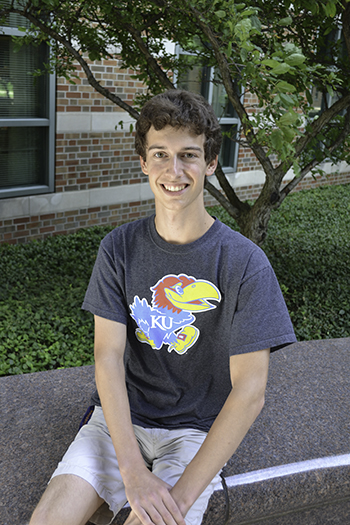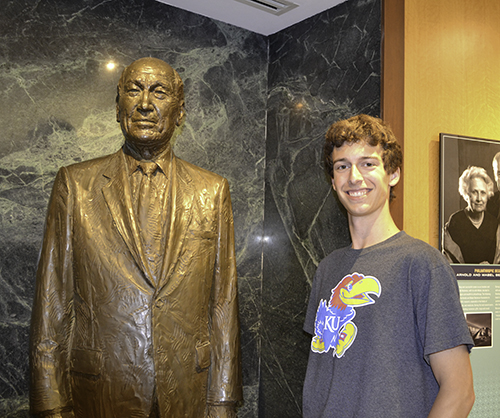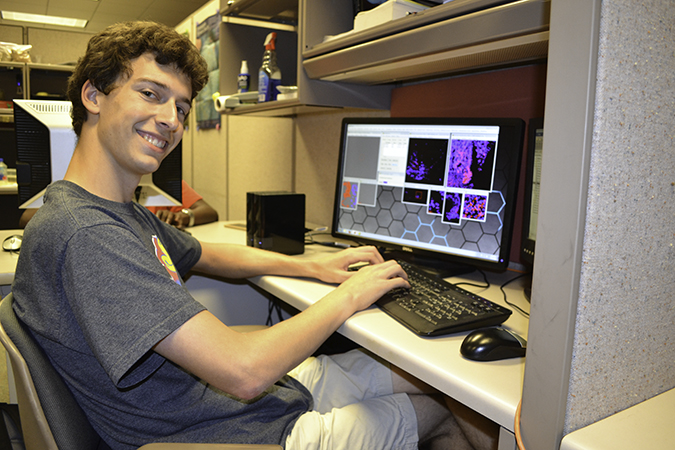Bioimaging REU's Matt Kavanaugh Experiences Cancer Research at Illinois

Bioimaging REU participant Matthew Kavanaugh.
July 29, 2016
Matt Kavanaugh had originally applied to Illinois as an undergraduate, but finances prevented him from coming here. So he matriculated to the University of Kansas, where the rising junior is majoring in Chemical Engineering with a concentration in Biomedical. However, when searching for something productive to do over the summer, he came across the NSF-funded Bioimaging Research Experience for Undergraduates (REU) at Illinois. “It caught my attention because it overlapped with my interests,” he explains. “And it was a place I liked and had had to decline in the past, but, ‘Now I’m here, and it has excellent facilities,’ so I came here.” And based on his exposure to cutting-edge cancer research in Bioengineering Professor Rohit Bhargava’s lab, he may have discovered his future career.
While Kavanaugh has done research in biomaterials before at Kansas, he says it was very different from what he did here. Working in Bhargava’s lab, he spent his summer training computers to diagnose breast cancer based on certain qualities, such as tumor grade and prognosis.
His goal was “to generate rules, pattern recognition, that the computer follows, and that would be on infrared spectroscopy data. So we scan it, have it analyze all the pixels and, using the rules we gave it, allow it to figure out the sample on its own.” Kavanaugh says the program could hopefully be used as a tool that would act as a second opinion to pathologists.
Based on his experience this summer, Kavanaugh feels he might be interested in cancer research as a career: “The more I learn about it, the more I see why people are going into it. Cancer is as unique as the person who has it. And to try and create general solutions is more challenging than anyone anticipated and is going to require a lot more manpower and individual effort. I can guarantee you that any work I do is going to be of value to someone…cancer is getting up there as a cause of death.”
A career in which he can make a difference is important to Kavanaugh:
“I think that’s the primary criteria of any path that I choose. I have to make a difference and find a personal value in doing so. That would be the most important thing to me.”

Matthew Kavanaugh poses by the statue of Arnold Beckman at the Beckman Institute for Advanced Science and Technology.
Kavanaugh believes that participating in this REU has had an impact on him in terms of whether graduate school and a career in research might be in his future. “It has definitely made grad school and a future in academia very strong candidates.” Although he’s still exploring his options, the summer has had a major impact: “I really want to spread out and see everything, then narrow in and focus on what I want to do. And this has been one of those major paths that I had to get myself to look at, and it hasn’t been disappointing.”
In addition to the research skills and knowledge, he also believes the summer has changed him as a student…for the better.
“I think it has definitely improved my discipline and work ethic,” he says. “Which I wouldn’t say was bad, but definitely not as strong as now. Because when you’re working, you aren’t doing it for a grade. I could make something to call my own. A lot of the culture I find in research isn’t, ‘Are you going to sleep? Are you getting three meals a day?’ It’s more, ‘Are you getting it done. Can you stick with it? Is this what you want to do enough to make these other sacrifices to give more of yourself than you thought?’”
Kavanaugh says one challenge he encountered and grew from this summer was learning to use his time and resources effectively:
“With computer applications, there is a lot of loading time and letting it do work,” he explains. “And if I were to take the easy route and say, ‘Oh, my program is running; I have nothing to do. Time to sit back and relax for 30 minutes,’ then it wouldn’t be remotely this close to a complete work. And so while this is running, to work on this, and have multiple things on the stove, it makes my time as effective as possible. And this is definitely a big challenge. Its applicable everywhere. The sooner you learn it the better.”
Story and photographs by Elizabeth Innes, Communications Specialist, I-STEM Education Initiative
For more related stories, see:
BioE, Funded, REU, REU: Bioimaging, Student Spotlight, Summer Research Programs, Undergrad, 2016
For additional istem articles about summer 2016 REUs, see:
- POETS REU Helps Illinois Undergrad Sabrina Yin Choose Her Career Path
- Undergrads Consider Nanotechnology Careers Thanks to nano@illinois REU
- Undergrads in Bioimaging REU Experience What Research, Graduate School Is Like
- Wendy Reyes Learns Life Skills—and to Like Research—in Bioimaging REU
- 2016 Chemistry REU Offers Undergraduate Students a Glimpse of Grad Life

Bioimaging REU participant Matthew Kavanaugh shows off the capabilities of some of the imaging software he used over the summer.













.jpg)
















